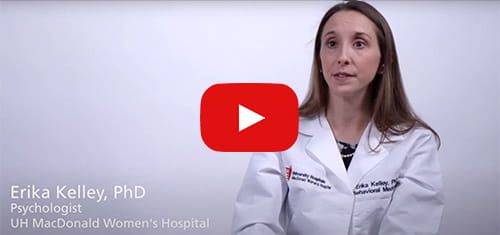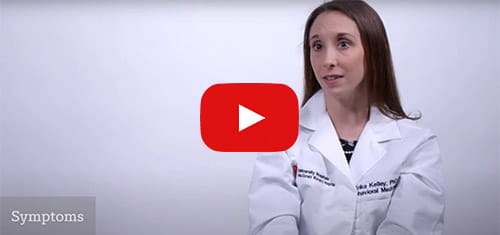
Postpartum Care
After giving birth to a baby, you will go through many changes, both physically and emotionally. You are learning how to be a new mother and are focused on your baby. However, you also need to take care of yourself. You will need plenty of rest, good nutrition, and help during the first few weeks of the postpartum period. By taking care of yourself, you will help ensure that your child has an attentive, engaged, and physically and emotionally healthy caregiver.
Make an Appointment
Offering in-person, video and telephone visits. Call 216-844-5086 today.
Physical Postpartum Symptoms
For a vaginal delivery with no major medical complications for mom or baby, you will typically return home within a day or two after delivery. During these first few days to weeks, you may experience symptoms such as:
- Bloody vaginal discharge that will turn to brown and then whitish in color
- A tender vaginal area, especially if stitches were needed to repair a tear or episiotomy
- Painful contractions as the uterus shrinks to its normal size
- Breast engorgement as you start to produce breastmilk
- Fatigue and soreness
Managing Postpartum Symptoms
- Get adequate rest: Sleeping while your newborn naps during the day can help make up for the sleep you lose at night waking to feed your baby; however, sometimes nighttime REM sleep may be necessary to function well. Have a partner or family member help during those middle of the night hours to ensure a few hours of sleep.
- Breast care: wear a supportive bra, use cold packs for swelling and engorgement, and try warm compresses to stimulate milk letdown. If you do not plan to breastfeed, use ice packs and bind your breasts for several days to help ease engorgement.
- Sitz baths (soaking in warm shallow water) can ease soreness and speed healing in the perineum (area between vagina and anus), especially if stitches were needed after delivery.
- If you had a C-section, keep the incision clean and dry to promote healing.

Postpartum Appointment
You should generally schedule a postpartum appointment with your healthcare provider about six weeks after delivery. During this appointment your provider will check to see if you are healing properly, assess your physical and mental health, address any concerns, and answer your questions.
Postpartum Mental Health
In addition to the physical symptoms, many women experience emotional symptoms during the postpartum period as well. These are often mild and temporary, but sometimes can be signs of more serious conditions such as postpartum depression or postpartum anxiety. It is important to recognize these symptoms so that you can speak to your healthcare provider and get the treatment you need.
Baby Blues
Many women (50 –80 percent) experience the "baby blues" during the first few days or weeks after delivery. The baby blues can be attributed to the hormonal changes happening in your body and worsened by lack of sleep and other stressors of new parenthood. Symptoms may include crying for no known reason, trouble sleeping, irritability, anxiety and restlessness. The baby blues usually go away within about two week and usually do not require treatment.
Postpartum Depression
Postpartum depression is depression that occurs within 12 months after the birth of a child and it is more pervasive and persistent that the baby blues. It typically consists of a variety of symptoms and signs, including lack of interest in things you typically enjoy, low energy, difficulty sleeping, anxiety, guilt and sadness or uncontrolled crying.
Find out more about postpartum depression, when to seek help and treatment options available.
Postpartum Anxiety
Symptoms of postpartum anxiety include persistent, intrusive thoughts that often revolve around the health and safety of your baby. These “what if” thoughts often involve imagining worst-case scenarios and can be preoccupying and hard to get out of your mind. Postpartum anxiety can also manifest in physical symptoms such as feeling restless or unable to sleep, increased heart rate and shortness of breath.
Learn about how postpartum anxiety and the treatment options available for it.

Postpartum Post-Traumatic Stress Disorder (PTSD)
Postpartum PTSD can develop if you experience birth trauma, such as an emergency C-section or a forceps-assisted delivery. It can also stem from postpartum complications such as hemorrhage or other events related to your health or your baby’s health. Symptoms include intrusive thoughts in which you re-experience the trauma, persistent anger, fear or self- blame, difficulty relaxing, feeling restless or jumpy, and avoiding reminders of, or talking about, your birth experience.
Learn more about postpartum PTSD, what the symptoms are, and how it is treated.
The Science of Health Postpartum Blog
Learn more about postpartum topics and hear from UH women’s health experts at The Science of Health blog.
Postpartum Psychosis
Postpartum psychosis is fortunately rare, occurring in approximately one to two out of every 1,000 deliveries. The onset is usually sudden, often within the first two weeks after delivery. This condition is often associated with the onset of other psychiatric conditions such as bipolar disorder or schizoaffective disorder. Symptoms can include:
- Delusions or strange beliefs
- Hallucinations (seeing or hearing things that are not there)
- Feeling very irritated
- Hyperactivity
- Decreased need for or inability to sleep
- Paranoia and suspiciousness
- Rapid mood swings
- Difficulty communicating at times
- Thoughts of harming self or baby
Treatment for Postpartum Mental Health Disorders
If you experience any of the symptoms of a postpartum mental health condition, do not delay talking to your healthcare provider about your concerns. Getting treatment can help ensure that your newborn stays safe and properly cared for. It also helps ease symptoms so you can experience all the joys of motherhood.
Treatment may include:
- Medications such as antidepressants
- Psychotherapy, including cognitive behavioral therapy, interpersonal therapy and other techniques
- Peer support such as support groups and educational classes
- Stress management and relaxation training
- Exercise
Make an Appointment
Your health is important. Get expert care.
Offering in-person and virtual visits. Call 216-844-5086






